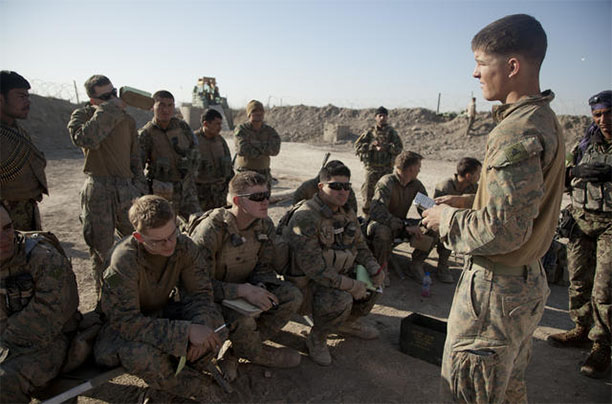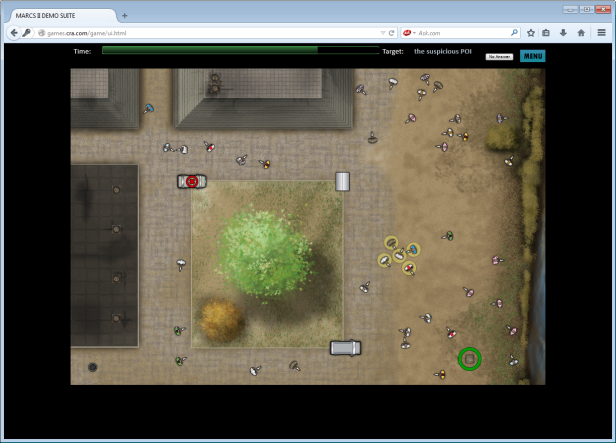MARCS
Training to enhance Marines' perceptual skills
Microgames for Acquiring and Rehearsing Cognitive Schemas for Perception (MARCS)
MARCS can provide Marines with a powerful training solution that augments existing training solutions. Microgames provide several advantages that can improve Combat Hunter training.
- They are particularly well suited to upcoming generations of Marines, who are used to playing games on their portable devices.
- As portable training tools, they allow Marines to be trained at home or while deployed and on personal mobile devices.
- Effectively designed microgames can achieve training in short time periods, particularly when addressing review tasks.
- Marines can use these microgames both before training to prime themselves for more efficient learning in the Combat Hunter course, and after training to review materials while deployed.

The Problem
The Combat Hunter Program, developed by the US Marine Corps, was developed to help Marines defend against attacks from snipers, terrorists, and other adversaries using veiled or stealthy forms of attack. The existing program is effective in training Marines to readily understand behaviors in a new environment, and to identify anomalies in those behaviors; however, it has two main limitations:
- Training limited to current deployment settings. Contextual changes, such as moving to a different urban environment, requires Marines to adapt cognitively as well as physically. This change can be difficult because current training does not focus on the skills needed to rapidly construct and adapt cognitive schemas to new environments.
- Lack of expert personnel to provide the training. Squads often send one or two members to the course, who then return to train their squadmates. Although the course improves attendees’ perceptual skills, it does not focus on establishing the level of mastery that these individuals would need to subsequently train other Marines in these skills.
To be more effective, the Combat Hunter Program needs to add meta-cognitive training that enables Marines to learn new contexts, to rapidly adapt cognitive schemas to new behaviors in new combat environments.
The Charles River Analytics Solution
A team at Charles River interviewed Marines who had participated in Combat Hunter training to identify potential gaps and challenges. The Marines identified challenges in skills related to combat profiling (reading the human terrain), including skills to understand respective locations of individuals, and expected movement patterns in an environment. Charles River focused on these skillsets when developing an innovative training program called Microgames for Acquiring and Rehearsing Cognitive Schemas for Perception, or MARCS, which was sponsored by the Office for Naval Research (ONR). Microgames are short-duration, portable games playable in virtually any setting. They are ideally suited for tasks requiring repetition to learn, enabling and motivating trainees to repeat numerous trials with different presentations to better learn new concepts and schemas. This kind of repetition is different from the more detailed and cognitively complex scenarios commonly used in immersive simulation-based games.
Each game unit in MARCS is divided into three difficulty levels. The trainee must correctly complete a number of exercises with a minimum level of performance to move on to the next level. The figure below is part of an exercise in which a trainee must observe the human environment in a crowd and identify a line representing baseline behaviors, so they can identify adversaries who display anomalous behaviors.

An exercise in MARCS
The Benefit
MARCS can provide Marines with a powerful training solution that augments existing training solutions. Microgames provide several advantages that can improve Combat Hunter training. They are particularly well suited to upcoming generations of Marines, who are used to playing games on their portable devices. As portable training tools, they allow Marines to be trained at home or while deployed and on personal mobile devices. Effectively designed microgames can achieve training in short time periods, particularly when addressing review tasks. Marines can use these microgames both before training to prime themselves for more efficient learning in the Combat Hunter course, and after training to review materials while deployed. These microgames have the potential to enhance the benefits of live training, helping to keep skills refreshed over time, and adapting these skills to their new settings, all with low cost and time commitment. We plan to further evaluate and test these games, and to extend our game library to address other Combat Hunter training objectives.
Contact us to learn more about MARCS and our other adaptive training capabilities.
This material is based upon work supported by The Office of Naval Research under Contract No. N00014-11-M-0514. Any opinions, findings and conclusions or recommendations expressed in this material are those of the author(s) and do not necessarily reflect the views of The Office of Naval Research.
